
Robert Gant’s a rarity in Hollywood. First of all, he went to law school. Second, he’s openly gay. And, as testament to our changing times, continues to get work.
The handsome 39-year old will soon appear in the here! network’s Kiss Me Deadly, on which Gant plays the first gay spy whose post-espionage life goes haywire after the return of an old friend, Shannen Doherty. The movie will hopefully be the first in a series, but Gant’s not sitting on his honches. He’s also just wrapped Special Delivery, a Lifetime movie in which Lisa Edelstein plays his love interest. Yes, a gay man’s playing straight: a growing – and welcome – in Hollywood.
Gant recently sat down with our editor to discuss the ins-and-outs of being homo in Hollywood, not being perfect and why Gant loves his life.
—
Andrew Belonsky: So, Robert, you’re playing the first gay spy in Kiss Me Deadly. Was it exciting to film?
Robert Gant: It was; it was a lot of fun. We shot in New Zealand, and I wish I’d gotten more of an opportunity to really get around and see the country. The day we wrapped I had to run back to L.A. to pick up my stuff and get back to New York, to take the Queen Mary over to London.
AB: Quite the jetsetter!
RG: They were showing a film that I co-produced with a bunch of folks, but starring Judith Light and Chad Allen and myself called Save Me, so I didn’t get to do any of the stuff I really wanted to do in New Zealand. It was a really beautiful place that I always wanted to go–it’s stunning and beautiful. We were in and around Auckland pretty much the whole time.
AB: Let’s go back a few years and talk about you growing up in Florida. How was that? How would you describe your childhood?
RG: It was really challenging. It was great in a lot of ways because I had two parents – a family who clearly did the very best they could. And I think, like so many of us [gays] – our families have tools they have to pass along to us, and usually the toolbox is missing a bunch of stuff and we compensate. We end up learning to operate in a system that is missing certain things. I think, like a lot of gay kids, I was missing that sense that I was loved.
AB: That you would love?
RG: That I was loved. Mainly – well, a lot of it had to do with my sexuality. And in Tampa – while a gay population has always existed, to my knowledge, and it’s certainly grown quite a bit, Tampa is not a mecca by any stretch, at all. I remember one of the first clubs I would go to always had the quarter well nights and the big drag shows.
AB: Of course.
RG: The drag shows seem to have been a big part of more rural, or rural-esque kinds of towns. Again, I don’t have any real broad knowledge of this, but I have a sense of it. I always find it so interesting as I encountered different people – a lot of guys who were dealing with their sexuality, who seem to have a real discomfort. And I get it, because it really challenges all kinds of notions of masculinity and everything else. There are a lot of reasons that I was really grateful for the experience, you know, I loved that those were some of my formative gay experiences.
AB: Did you feel masculine growing up? Because looking at you and seeing you act, you’re pretty masculine, if you ask me.
RG: Well, I’m gonna preface this by saying quote-unquote “masculine” is what I’m really talking about. Masculinity is an entirely subjective notion. But, subjectively speaking, I did not feel “masculine.” I felt a real driving desire to create that for myself, and I became hyperconscious.
AB: Yes.
RG: I remember one time having my hand slapped down because I had it – kind of up or something. There was such shame about that, and I became hyperaware of the way that I spoke and the way I carried myself. It became something of a mask, and so much of my life has been about peeling these layers away. And life keeps getting infinitely better as a result. Go figure.
AB: Do you feel like you’ve peeled away all those layers?
RG: Heck no! You know a friend of mine once said “We die unhealed,” and I always balked at that – as I did many things that he said that I now also believe. I pretty much agree with that one as well: “We die unhealed.” Not to say that the majority of us is unhealed, but there are invariably things that we’re not likely to get to in our lifetimes. Even if you were very committed to growth and healing and self-realization, there’s still likely to be stuff floating around when we pass on. So I just do what I can, and really I feel a lot better and enjoy myself a lot more as a result.
AB: I was going to save this question for the end of the conversation, when we knew each other a little better, but I think this is a good time to ask: What’s your greatest weakness?
RG: That’s like one of those job interview questions.
AB: Yeah, I do that sort of thing.
RG: Okay, fair enough, that doesn’t bother me. (Laughs). Um, I don’t think I have one; I think I have a lot of them! You know what? Actually, I don’t think they’re weaknesses; I think they’re challenges, that I want to continue to grow through and heal and improve upon. So, as far as that is concerned – I had a perfectionistic tendency when I was a kid: the idea that “if I’m perfect then I’ll be loved.” And I had one parent who was particularly hypercritical when it came to me – and when it came to anybody else – so I definitely picked up that perfectionist tool. That’s been a good one for me to work at and peel away.
I became very conscious of what people thought, and so a lot of my process became about losing that. Interestingly enough, as an actor, that’s something that’s viable, to be able to lose that self-consciousness enough to have a truthful experience in front of people or in front of the camera. So one more way that I think I’ve taken to acting, without even knowing it, was because I had to heal one of the things that was a great roadblock or challenge for me.
AB: How did your parents take you coming out?
RG: They were a mixed bag. My mom had a really hard time with it; my dad may have, but he didn’t say much. I think it was tough for him, but he processed it mostly internally; my mom processed it very vocally, very externally.
AB: Are they still alive, your parents?
RG: Oh yeah.
AB: You think they’re proud of you?
RG: I think they are, yeah. I think they’re actually very proud of me.
AB: That’s what they should be, I think.
RG: They weren’t right away. But a friend once said to me that we forget that our parents have to go through a coming out process as well. They have to go through their own journey around it, and what’s great is that we get closer and closer and those relationships continue to strengthen, and I have more and more fun with them as a result.

[A scene from Kiss Me Deadly.]
AB: Let’s get on a little less of a serious note. One of the first times I saw you on television was on Melrose Place. – which is still one of my favorite shows. You played two different characters on that show.
RG: I did. Good awareness, I mean you’re clearly a fan of Melrose Place.
AB: Oh yeah. When you got called back for the second time–I guess it was like two or three years later–did they address that to you in casting?
RG: Not even a little bit.
AB: They must have remembered you, right?
RG: Yeah, you know there’d been a lot of time that had passed; the first role wasn’t all that significant.
AB: You were like a waiter or something…
RG: I was a room service waiter, which was second job as an actor, at least with a speaking part. My first was one line was on Ellen, the first episode that it was called Ellen actually. And I had an unspoken part on a show called My So-Called Life. Claire and her friend were in the bedroom watching their parents’ “How to Improve Your Love Life” video…
AB: You were in the video?
RG: I was the guy in the video. [Laughs] We were kneading bread together and I was combing her hair – it was all these non-sexual ways to be sexual and intimate or whatever. It was really funny.
AB: So you had My So-Called Life, you had Ellen, you had Melrose – these are all pretty gay shows.
RG: (Laughs). Well, I mean, certainly for a gay interviewer or audience member, the context would be gay, but I’m sure there were people who didn’t see them as gay shows at the time.
AB: Yeah, you’re right.
RG: But it’s funny – there are things we [gays] fit within the rubric, we certainly–for whatever reason, gay people were/are drawn to certain shows and those are some of them. It’s a matter of perspective, I guess.
AB: Speaking of being gay and acting – do you feel that being openly gay has limited your career in any way?
RG: There is no way for me to really measure that. That said, I would venture that there are parts that I have not gotten because I’m openly gay, and there are parts I have gotten because I’m openly gay, and that there are plenty of them that just didn’t matter one way or the other. I think that is pretty much going to be the case across the board.
Now, I think the determination is really a personal one and an individual one; it has to do with where you are as a person. I wouldn’t trade coming out for the world, and I would even say that it was good for my career. I say that because, one I want to affirm that, one, and two, because I think that… Russell Davies said that being a gay man gave him his career and I got it – I was like, yeah, you know, certainly, God knows with “Queer as Folk.” And so much of that for me has to do with what it’s done for me as an actor, and what it’s done for me as a human being–it shows up very differently in my life across the board.
In terms of my acting work, my acting work has improved vastly as a result of not having to use so much energy to maintain the façade. And to keep that in place also keeps a certain amount of inauthenticity in place, so as a performer or actor, I think that can be very detrimental–it was for me, certainly.
But I think there’s plenty of phobia. There’s homophobia along all ranks, certainly there’s plenty in Hollywood and there’s plenty of internalized homophobia. And at the same time, there are younger generations coming into power. I get emails from agents and writers and producers who are now in some positions of power who are like, “You know what, I really have a lot of respect for you…” I’d say it’s a little bit of the older and even middle-aged guard who still haven’t processed as much of that stuff, even though they may have kids and a full life as a gay person. It’s generational.
It’s also because this town, as much as entertainment is intertwined to some extent with messaging and social consciousness, it’s really a business. Above all else, it’s about ticket sales. So even if something wouldn’t really compromise ticket sales, there are going be some people who just don’t want to take a chance.
AB: We are also seeing a change in Hollywood in another way–we’ve also got Neil Patrick Harris and T.R. Knight who are out, and I think that’s really incredible.
RG: The last great frontier is the openly gay leading-man-type guy, and that’s the frontier that a number of us are all slowly crossing. Neil Patrick Harris playing that part, it’s a contribution in that direction. It’s a comedy, and that’s easier for people to embrace, and he’s probably not as much your classic leading man type, although he’s certainly more so than we’ve seen. And T.R. also, like it’s another move forward, another contribution to the whole effort of crossing this frontier. And gradually that’s happening, it’s like all progress: you make small steps here and there and eventually there’s a big leap. Forward progress is also not a straight line–we’ll move forward and we’ll move back a little bit–which is why I’m not so concerned with all the minutiae, this or that state statute. Collectively we’re moving forward, and I really enjoy my life.
AB: I’d imagine. It seems like you probably have a pretty good life.
RG: I do, I really do.
You can currently view Kiss Me Deadly here!

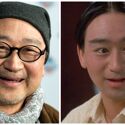
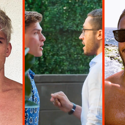
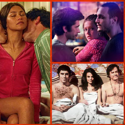
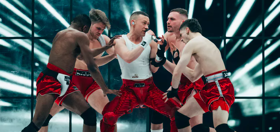

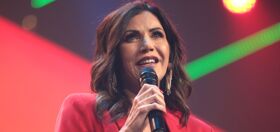
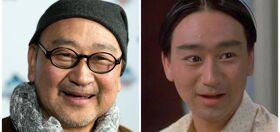
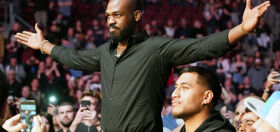
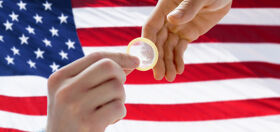
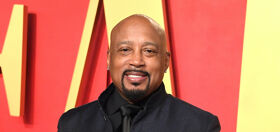
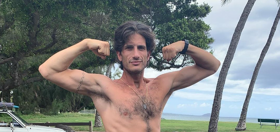
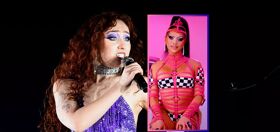

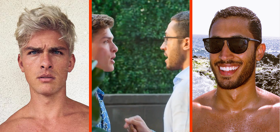
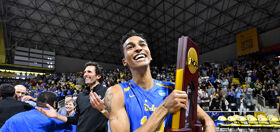
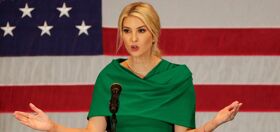
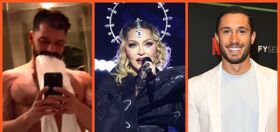
Rock
Love him! He showed plenty of his incredible body on Queer as Folk!
Z.
I like him too!
http://www.ilovezeren.com
Darth Paul
I dismiss. Orange people are inherently untouchable.
dvlaries
Good for him. He managed to avoid of all mention of the creature he had to pretend sexual ardor for over four -what had to be- agonizing seasons. Whatever the highest honor is for civilian bravery, Gant and Chris Potter earned it.
abelincoln
Smart and gorgeous – works for me.
Shabaka
I fell in love with him-yeah right-on Queer as Folks and haven’t had a break since. Isn’t he dating what’s his name from Queer Eye?
parisinla
WHATEVER DVALRIES Hal Sparks is my hero!
weetabix
Are “honches” like “haunches”???
I’m just sayin’.
Geoffrey
Aside from being major eye candy, Gant impressed me w/his charity work…what other high profile gay actor takes up homo senior citizens as his cause? That’s amazing. Oh yeah, he’s major eye candy too….did I already say that?
Fred
I was a huge fan of his, until I got to meet him. While he is all kinds of beautiful in person, I sort of got the cold shoulder from him, when I tried to speak with him. Everyone else, Chad Allen, and the guys from Dante’s Cove went out of their way to be friendly. Robert was very stand-offish. I was really disappointed.
Jennifer
Yes, Weetabix, it is “haunches”. I was just coming here to point that out, bitch that I am. 🙂
afrolito
This guy is a huge vanilla bore.
Maharajah
I don’t know which part of him makes me weak in the knees more – be it his talent, or his educated mind, or his huge heart – or maybe, his impeccable look – or just maybe it is the intricate mix of them all. Anyway, I did get the oppurtunity to speak with him at a film festival a few years ago, and while he came off as “stand-offish” at first, he warmed up a bit. Maybe he is just a bit shy and needs to get to know you a little bit better before he opens up a bit?
Puddy Katz
He’s seems very nice and intelligent. How rare is that in actors!
Apparently he changed his name and is really Hispanic. Maybe that will undermine the “vanilla factor” for some of you’s.
afrolito
Not really, since I already knew he was latino (of cuban descent).
The fact that he anglicized his name, and became another vanilla Ken doll, is what makes him even more dull.
M Shane
Seemed to me that he is far from being a Ken Doll(which implies emptiness)kind of person , but more straight forward and honest about things like not feeling loved (for himself) and not getting the things which would be reenforcing from your family but having to create yourself e.g. with respect to being masculine. i thought that he was really pretty
intimate and honest right off.
He doesn’t look very latino. being cuban could mean lots of things. As far as being stand-offish, it seems to me that often that implies
shyness more than anything.
afrolito
“He doesn’t look very latino.”
What is that supposed to mean? Latino is not a race, but rather a cultural identity. One can be white and latino, just as they can be black and latino. Celia Cruz was as black as night, but she was just as latino as JLo, Andy Garcia, Cameron Diaz, Ricky Martin, or Robert Gant.
Gant seems like a nice guy, but he has never interested me in the least on screen.
fredo777
Zen Ben. One of my favorite QAF characters + a total cutie pie.